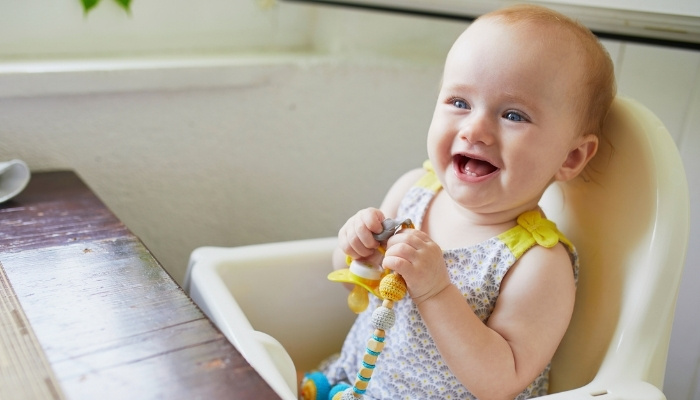It is very common for infants to engage in self-stimulation. This is because their brains are wired to seek pleasure and they naturally gravitate towards activities that provide soothing and comfort. Self-stimulation falls under this category.
The other truth in this matter is that discussing or witnessing it tends to make parents uncomfortable. Educating ourselves about this uncomfortable topic can help us react better and understand it better if it does happen.
Does every baby self-stimulate?
Not every infant will touch themselves or rub up against things, but it is more common that we think. Child masturbation was first discussed by Still in 1909.
It was characterized by “self-stimulation of the genitalia accompanied with sweating and flushing” and was first noticed in infancy or early childhood.
Medical professionals have been addressing this issue for a very long time, so rest assured, your baby isn’t the first to seek self-gratification.
It’s more common than people think because it isn’t something that we talk about freely. Babies are naturally curious about their bodies.
It’s not uncommon for babies to touch themselves during diaper changes or baths. Older infants might notice that repetitive motion against an object feels good and will engage in that behavior.
High chairs seem to be a common item that babies seek to stimulate themselves with, so that will be the focus here.
1. Rule Out Rashes or Possible Injury
First and foremost, parents want to inspect the area a baby is rubbing against the high chair. Check for rashes or cuts or any other kind of skin irregularity that might be causing any discomfort.
Rubbing against something like a car seat or high chair could be your baby’s way of trying to alleviate the pain.
2. Consider Sizing Up or Down in Diapers While in High Chair
Your baby could be rubbing against the high chair because their diaper is too small or too big. The sitting position could exacerbate the diaper’s discomfort, which is why that behavior is more pronounced in the high chair.
3. Change Brands of Diapers
A baby could be rubbing against the high chair because their diapers are making them itchy or causing pain. Exploring a diaper that has more organic materials or even trying a cloth diaper could help this issue.
4. Consult Your Doctor
Your doctor could do a more thorough exam to see if there is actually some underlying infection or physical problem.
Doctors are also very well versed in talking about things casually that tend to make the general public uncomfortable.
They will also be able to help worried parents normalize this infant behavior and, hopefully, relieve anxiety.
5. Control Your Tone of Voice When Addressing Baby During Self-Stimulation
Research suggests that babies can begin to decipher meaning from your tone of voice between the ages of 4 and 7 months.
Should you use a sharp tone or loud voice when correcting the behavior of your child rubbing on something, babies could grow upset or feel ashamed.
Also, try to understand that your baby doesn’t know this behavior is inappropriate in public, and therefore, associating a sharp tone with this behavior won’t help them make later connections that this is a normal activity but is best done in private.

6. Try Not To Jump to Conclusions
Baby self-stimulation does not mean that you’ve done something wrong as a parent. It also doesn’t mean that there is something wrong with your child.
Some parents have postulated that this behavior in infancy must mean that their child will be promiscuous or overly sexual later in life, and this simply isn’t the case.
Babies seek comfort, and touching areas that have a lot of nerve endings to hard objects in repetitive motions makes them feel good. Try not to overanalyze it or make it something bigger than it is.
7. Avoid Internet Search Engines
Especially regarding this subject, which has not been researched very frequently, the internet will provide very little piece of mind.
When Googled, “child rubbing on high chair” just leads to many forums of concerned parents who are getting other war stories from other concerned parents.
Do yourself a favor, save yourself some anxiety, and just ask a trusted friend or a medical professional.
8. Try Removing Babies Diaper While In High Chair
Removing the diaper could remove part of the equation that might cause this behavior to feel good. Obviously, this could end up a messy scenario in a different way, but it also might be a solution should you find yourself very concerned.
You also want your baby to learn to focus on eating while in their high chair and not associate that time with something different or being distracted by self-stimulation.
9. Switch Baby to a Booster Seat or Different Chair
If every other avenue to curb this behavior has failed and your baby remains unable to focus on the act of eating in his/her high chair, consider a booster seat or a chair without a middle section they can rub against.
Many are equipped with straps if you are concerned for your babies’ safety.
10. Adjust Your Expectations
This is probably the hardest one to do! As parents, we want a solution that can actually fix the problem.
However, trying to teach your 5-month-old to stop a behavior when they don’t have the mental framework or language skills to grasp it can feel very futile.
Try to take a step back from your worry and understand that your baby is seeking comfort from a behavior, similar to sucking on a pacifier or their thumb.
Also, try to remind yourself that nearly all babies outgrow this behavior and that it doesn’t have future implications on their sexuality.
Conclusion
Some of our babies’ behaviors trigger things in us. We grow concerned about what others will think if our babies are too loud, too attached to us, or different than other babies.
Self-stimulation can make a parent very uncomfortable and trigger negative feelings in us.
When trying to find a solution to help your baby stay focused while eating in their high chair, try to remember that this behavior is normal and will most likely pass quickly.
Like adults, babies are human beings and we like things that feel good. Patience and understanding can go a long way where infant self-stimulation is concerned.
As a twin mom herself, Nikki is passionate about helping moms and twin parents learn how to manage their chaos better. She is a Licensed Professional Counselor (LPC) practicing Marriage and Family Therapy.

